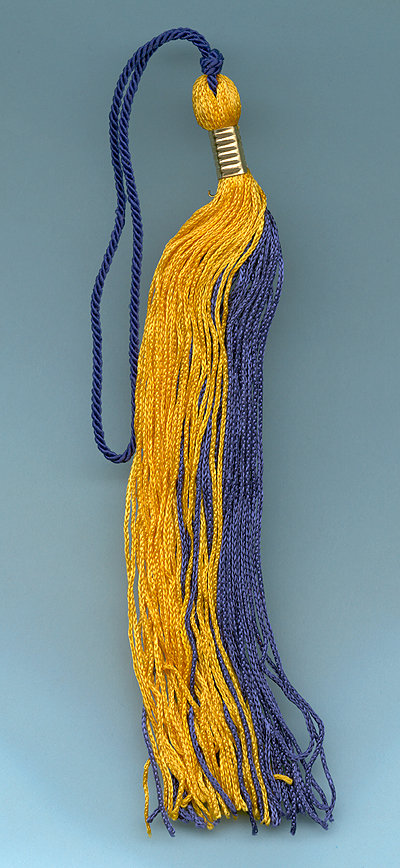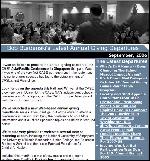
|
| Bob Burdenski's Latest Annual Giving Departures |
|
|||||||||||||||||||||||||||||||||||||||||||||||||||||||||||||||||||
|
It's an honor to be teaching CASE's first programs in India next month, in Delhi and Hyderabad. I'm teaming up with Gretchen Dobson of Tufts University for workshops on alumni relations and annual giving. If you're going to be on the Subcontinent, be sure to stop by! Enroute, I'm stopping in London to host a CASE Annual Giving Masterclass on March 19th, along with three old friends: Sam Davies from the University of Brighton, Natalie Calkin from the London Business School, and Shona Nicholson from Oxford University. This week, I'm at Tulane University in New Orleans, kicking off my spring schedule of one-day annual giving workshops. Come and learn some new annual giving strategies for good results in a bad economy. See below for the latest schedule. We've been very pleased to be working with a number of new client institutions in recent months, including INSEAD, Manchester Metropolitan University, Northwestern College, Willamette University, Loughborough University, the Chinese International School and the International School of Brussels. Be sure to check out my summary report of annual giving staff sizes at various institutions. Also included this month is some wisdom from FundList and a podcast on annual giving volunteering recorded at CASE NAIS with the marvelous Leslie Hutchens from the Sidwell Friends School. Best wishes for ongoing fundraising success. If you'd like a little extra hands-on help thinking about your annual giving program during challenging economic times, contact us for a chat about how we can help. Bob

The 700 participants in Bob's 2008 Annual Giving Salary Survey were asked about the number of staff devoted to annual giving at their institution. (We often lament that there aren't enough annual giving staff, but just how many are there?) You can download a free summary report of the findings, sorted by institution type, location, alumni base and annual giving revenue. Also, mark your calendar to participate in Bob's 2009 Annual Giving Salary Survey, which will launch in March.

Everyone knows about the struggling economy, but does that mean you should bring it up in the phonathon?" Fundlist contributors were nearly unanimous on the subject. Here are some of the responses: "We're not deliberately addressing the economy in the script. We did, however, put together some common objections and suggestions on how to deal with them and I've been reminding callers to pay attention to the economic objections. We were already getting "times are hard" push-back last spring, so the experienced callers are used to it and none of them seem discouraged. I have also been doing some training focused on soliciting larger gifts and credit card gifts, to maximize income where constituents are still willing to give. Coupled with a bonus incentive for good performance in this area, plus the fact that better callers get more work, I'm finding that my team is working harder than before." -- Jane Steen, Trinity International University "(We) don't include anything about the economy specifically. I found that it gave a negative/depressing spin on addressing the economy. I have my callers emphasize the NEED of private support." -- Michele Hicks, Illinois State University "We don't mention the recession unless it is used as an objection, then we inform them that is why their support is more important than ever. I wouldn't want to (bring up the economy) in the script because it gives them a reason to say no." -- Kimberly Knesek, University of Massachusetts Lowell "One of my callers expressed that, in some cases, she can tell that prospects are using the economy as (an excuse to not give). We still have people who are willing to make gifts. Teach the callers not to project their personal feelings about the economy onto the prospect. We really DON'T know what people are willing and able to contribute and we shouldn't go in with a defeated attitude." -- Gloria Morgan Goosby, Georgia Southern University "Mentioning the downturn in a direct mail pack from one charity reduced the average value of donations received by up to 45%. Benchmark your ask amounts against (your average gift) and against your pledge rates. Drop an ask level to a well-defined segment for a night or two - does the pledge rate go up? If it goes up enough to offset the reduction in gift value, there's your new ask level - for a while, at least!"-- Adrian Salmon, University of Leeds "We are only mentioning it if the alumnus/a mentions it. My feeling is there's no need to put that thought in an alumnus/a's head if it wasn't there to begin with." -- Rosalind Weiss, Florida Institute of Technology "We are not proactively mentioning it in our scripts, but acknowledge the economy should any alumni bring it up. Like many, we cite that the economy has impacted BYU's students too, so alumni support is still very much needed." -- David J. Smith, LDS Philanthropies Brigham Young University

Bob Burdenski is bringing the most innovative new annual giving strategies to you in a series of regional one-day workshops in 2009. It's an important time to re-calibrate your annual giving goals and priorities in light of the downturn in the economy. How do we achieve continued success, and how do we maximize the value of our annual giving efforts? Give your program a recession tune-up and collect a day's worth of new ideas and innovations for annual giving success. Bob's programs are famous for featuring many examples from other institutions. Bob sees the best new ideas in annual giving --come and see the latest he has to share. The one-day workshop agenda includes:
As A Special Bonus: Every institution
will receive a
copy of Bob's new CASE book, More Innovations
in Annual Giving - a $50 value - at no
additional cost.
** The London workshop is a CASE-sponsored event with separate pricing and registration via the CASE Web site here.

Times are certainly tough on Wall Street, and the automakers are suffering as well. But consider the hardships that nonprofit organizations are enduring. Public funding and charitable donations have plummeted even as demand for nonprofits' services - especially for things like food and housing assistance - has risen sharply. The good news is that the current economy is also creating potential opportunities for nonprofits. More than two million people lost jobs in 2008, and many talented and experienced managers have time on their hands. If they started volunteering, they could help many nonprofits navigate the next couple of years. Some experts say volunteer work can help unemployed professionals keep their spirits up, make new contacts or even to try a new field. "Three-quarters of people find jobs through being out there, engaged and meeting people," said John A. Challenger, C.E.O. of Challenger Gray & Christmas, the outplacement firm. "It's also just extremely valuable to people who are out of work to find work that has meaning when you're sitting out there waiting. Feeling you're giving back can help keep your spirits up, which you need." Unfortunately, volunteering has long been a little like daily exercise - an excellent idea that many people don't act on. Rates of volunteering among Americans 16 or older rose from 20.4 percent in 1989 to 28.8 percent in 2003, but slipped to 26.2 percent by 2007, according to the Corporation for National and Community Service. And many volunteers drift away: more than a third of the 61.2 million who volunteered in 2006 didn't donate any time the next year, according to an analysis of data by the corporation.

Bob's presentation with Leslie Hutchens at the recently-completed CASE NAIS Independent Schools Conference in Denver looked at the effective use of volunteers in annual giving programs. Are people less inclined to be volunteers these days, or are we guilty ourselves for not managing better? Leslie's the director of annual giving and major gifts at the Sidwell Friends School in Washington, D.C., and shares first-hand some of the satisfying, and sometimes challenging, experiences she's had with volunteers. You can listen free to a recording of Bob and Leslie live at the CAIS NAIS conference. Bob's podcast page on his Web site features many more interviews and presentations that you can download free of charge. If you have iTunes installed on your computer, click here to go straight to Bob Burdenski's podcast page in iTunes. Otherwise, use the link below.

Hit hard by the recession, many companies have trimmed contributions to employees' 401(k) plans, suspended bonuses and cut back on health-care benefits. Now, a growing number are also taking the ax to their charitable matching gifts and volunteer programs. Such programs, in which companies match employee contributions -- or donate funds based on the number of hours they volunteer -- have been popular for decades with nonprofit groups, employees and firms themselves, who use it as a recruiting tool and to burnish their image, as well as benefit from tax deductions. But over the past year, more than a dozen large U.S. companies, from auto makers to computer-services firms, have shut the doors on their matching programs or significantly reduced the matching ratio, say from $3 or $2 per every dollar donated by an employee to $1 or less. Other changes include lowering matching limits or excluding retirees or part-time employees from participating. While matching programs make up only a portion of total corporate giving, experts say cutting these programs will have a significant effect on nonprofits and universities at a time when many are already struggling. Companies that have suspended or reduced their corporate matching-gift programs include Northrop Grumman Corp., General Motors Corp., Embarq Corp., CSX Corp., Procter & Gamble Co., Weyerhaeuser Co., IndyMac Bank, Pfizer Inc. and R.H. Donnelley Corp. Total U.S. corporate giving amounted to $8.6 billion in 2007, the most recent data available, according to the Conference Board. About 10% of that came from matching-gift programs, estimates HEP Development Services, a Leesburg, Va., company that tracks matching gifts at over 16,000 companies in the U.S. "Companies expect giving for 2008 to be relatively flat, with budgets holding at 2007 levels," says Carolyn Cavicchio, senior research associate at the Conference Board. Matching-gift programs, which began more than 50 years ago, tend to fluctuate with economic cycles, experts say. Companies give when they have extra profits, and cut back when they don't. When the economy slowed after the dot-com bust, a number of big companies (including Ford Motor Co. and Dow Chemical Co.) suspended their matching-gift programs. Many, like Dow, have since reinstated the programs. Others, like Ford, did not.

Students who plan to graduate in the spring have an opportunity to give back to the University of Idaho. Students can donate money for an extra tassel they can wear to graduation. "With this senior gift, we wanted to get students to participate in a different way," said Lauren Armstrong, president of the Student Foundation. "Students have the choice to donate to whatever they want," said Armstrong. "It is important to give back to the university." The minimum donation for the tassel is $20.09 for the 2009 graduation year, she said. Students can donate any amount they want, as long as it is at or above the minimum. "If students want to order these tassels, there will be booths set up at different times around campus, and they can order tassels, online at www.uidaho.edu/classgift" Armstrong said. There is a drop-down list in which students can choose where they want to donate. "In this, we want to promote the idea of philanthropy to the University of Idaho community, faculty, staff and students," said Meredith Malek, adviser for the Student Foundation. There are hopes it can increase underclass giving as well, she said. "We have tried a few different aspects in the past few years," Malek said. "We are moving forward with this new idea." She has seen this idea at other universities, and now they are bringing it to the UI campus, she said.
Bob's brand-new CASE book - More Innovations in Annual Giving: Ten Global Departures That Worked - features creative annual giving strategies from institutions around the world, including Australia, India, Singapore, Hong Kong, France, the U.K. and beyond. "This second book by Bob Burdenski for CASE will further extend the reach of inspiration and courage. Bob's case studies, filtered through his expertise and enthusiasm, raise the competence of institutions around the world as they contemplate where to go next with their philanthropic fundraising," says Joanna Motion, Vice President for International Operations for CASE in London. The book is a follow-up to Bob's previous CASE best-seller, Innovations in Annual Giving: Ten Departures That Worked, which featured ten case histories of U.S. schools, colleges and universities that tried new annual giving strategies with success. Bob's featured examples from around the world include:
You can download a sample chapter on Leadership Annual Giving Personal Solicitation direct from the CASE Web site here.

All of Bob's previous (although now, not-so "Latest") Latest Annual Giving Departures email newsletters are available for reading free at BobBurdenski.com. Browse more than 5 years of newsletters - you can track the beginnings of data mining, recurring giving, and YouTube as annual giving strategies during that time. Thumbnail summaries of each newsletter tell you what's included in each one.
|
|||||||||||||||||||||||||||||||||||||||||||||||||||||||||||||||||||
